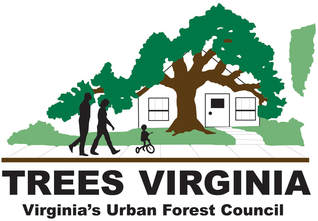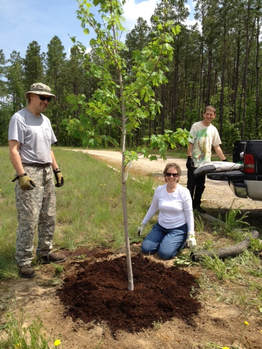Even our most rural Virginia Master Naturalist chapters have developed areas within their communities, and learning about ecosystem functions in urban and developed areas is as important as learning about ecosystems in more wild places. Here are three (of many) ways that you can learn more about urban forests, specifically. In a future newsletter issue, we will discuss ways that VMN volunteers can put that learning into action through volunteer service relating to urban forestry.

ONE: Attend the upcoming program,
“Urban Forests for Your Health: How Trees Can Save Your Life”, organized by
Trees Virginia, Virginia’s Urban Forest Council. The purpose of this bi-annual conference is to present research relating to urban forests and human health. Speakers from the USDA Forest Service and other organizations will review the research on connections between nature contact and human health, how medical facilities are incorporating nature to improve patient outcomes, how localities are using city parks to address community challenges, and how to communicate the importance of green space to city officials and other people.
Details:
November 9, 2017, 8:00 am – 4:00 pm
Algonkian Regional Park, 47001 Fairway Drive, Sterling, VA 20165
Registration and more information at http://treesvirginia.org/events. Registration closes November 3!
If you miss this event, watch for future urban forestry workshops and roundtables from Trees Virginia; there are several other learning opportunities throughout the year.
 VMN volunteers improving a landscape by planting a tree. Photo by VMN-Pocahontas Chapter.
VMN volunteers improving a landscape by planting a tree. Photo by VMN-Pocahontas Chapter.
THREE: Learn more about urban wood utilization. We talk a lot in our Virginia Master Naturalist curriculum about the importance of urban forests and the ecosystem services they provide. But, what happens to urban trees when they get sick and die? In many situations, it wouldn’t be practical to leave the tree in place. It might be in a place where it could cause property damage or block a road or sidewalk. Or, the urban tree might still be alive but need to be removed because of a new building or conflict with overhead powerlines. Possibly the property owner just does not want the tree there anymore for whatever reason. The wood from an urban tree removed under these circumstances could just be burned or turned into mulch. There are a lot of other possible uses for that wood, however! It could be made into much more valuable wood products, such as building lumber, furniture, or flooring. In some cases, the imperfections, such as knots, found in an urban tree may actually add value, as customers look for wood that has “character” for furniture and other artistic uses. The Virginia Urban Wood Group aims to provide improve the utilization of Virginia’s urban forest resources through education and enhanced marketing. Right now, there are few contractors poised to provide the necessary services (e.g., small-scale logging, portable sawmills) to make use of this wood in an economically advantageous way. The Virginia Urban Wood Group hopes to increase the number of service providers who can fill this niche, and to link them to marketing opportunities. Read more about this effort at
http://treesvirginia.org/outreach/virginia-urban-wood-group.
We thank the Virginia Department of Forestry for funding we receive through an Urban and Community Forestry grant that helps us communicate urban forestry learning and service opportunities to our volunteers.
 VMN volunteers improving a landscape by planting a tree. Photo by VMN-Pocahontas Chapter.
VMN volunteers improving a landscape by planting a tree. Photo by VMN-Pocahontas Chapter.

